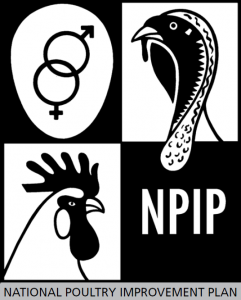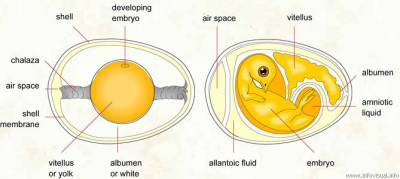Ordering chicks from a hatchery
SELECTING A HATCHERY
 It is important that the hatchery you select to get your chickens, turkeys or waterfowl be NPIP-approved. The National Poultry Improvement Plan is a voluntary program developed in 1935 to eradicate Bacillary white Diarrhea (BWD) cuased by Salmonella pullorum. S. pullorum can be transmitted through the egg from hen to chick. By screening breeding stock the occurence of Salmonella pullorum is now very low.
It is important that the hatchery you select to get your chickens, turkeys or waterfowl be NPIP-approved. The National Poultry Improvement Plan is a voluntary program developed in 1935 to eradicate Bacillary white Diarrhea (BWD) cuased by Salmonella pullorum. S. pullorum can be transmitted through the egg from hen to chick. By screening breeding stock the occurence of Salmonella pullorum is now very low.
ORDERING CHICKS FROM A HATCHERY
When an egg is laid it contains all the nutrients need for the embryo to grow into a chick (refer to the Factsheet Chicken anatomy and physiology: Female reproductive system for more information regarding egg production).

Right before the chicks hatches the yolk sac, with the last of the yolk remaining, is taken into the body cavity. This remaining yolk serves as the main food and water source for hatchlings for the first 48 hours. It is this feature of the avian reproductive system that makes shipping chicks through the mail possible. It is important, however, that the chicks arrive quickly and that they receive feed and water immediately after arrival.
Most hatcheries offer you the following choices:
- Males only (cockerels), females only (pullets) or an unsexed group of chicks with both males and females (referred to as 'straight run'). Chicks can be sexed either through their anatomy (known as vent sexing) or through a sex-linked feature (such as feather color or speed of feather development). In either case expertise is required but no one is 100% accurate. You should expect to get up to 10% of the opposite gender when ordering sexed-chicks.
- Chicks can be vaccinated against Marek's Disease in the hatchery. Marek's is a highly contagious viral disease that causes nerve damage. Marek's is carried by a number of wild bird species so if you are going to be raising your chickens outdoors it it something to consider, especially if there is a history of the disease in your area. Waterfowl such as ducks and geese do not require the vaccine.
- Some hatcheries may also be able to offer a vaccine for coccidiosis or supplementation with a probiotic. These are typically done with the chicks in the shipping boxes.
Young chicks (as well as hatchlings of other poultry species) are unable to regulate their own body temperate until they are a few weeks old. It is important that the chicks be kept warm, especially while being shipped. While in the shipping containers the chicks are kept warm by the body heat generated by the chicks themselves. For this reason most hatcheries have a minimum shipping order of 25 chicks. The minimum order for other species depends on their size. Minimum orders for ducklings can range from 10-15 depending on the hatchery.
Chicks are shipped in cardboard boxes designed to keep them warm while allowing the fresh air to enter. The boxes come in various sizes but two are most common - small boxes designed for 25 chicks and larger boxes designed for 100 chicks (the box is divided into four areas of 25 chicks each).
Hatchlings are shpped via express or priority mail to ensure quick delivery. Most hatcheries won't ship right before or after a weekend so that chicks are less likely to get delayed enroute.
When the chicks arrive at your local post office they will call you to come pick them up rather than delivering them to your door. In some cases the chicks may arrive early in the morning (prior to post office officially open to the public) but you can usually pick up the chicks from a rear access door.
Although most shipment of chicks arrive safely and will little distress, most hatcheries will include extra chicks to account for any mortalities that may occur.
Some hatcheries insure chick shipments with the post office. Whether the shipment was insured or not it is a good practice to open the box when at the post office to check for any losses. In order to be reimbursed for chicks that have died in transit a postal worker needs to sign your claim form as a witness to the loss. If you take the box home you can not bring it back later to make a claim since they have now idea what happened to the chicks from the time they left the post office.
